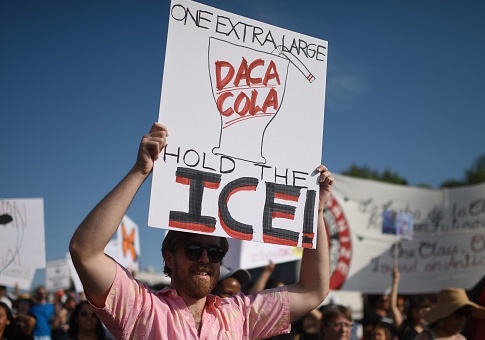Recipients of protection from deportation under the Deferred Action for Childhood Arrivals (DACA) program are not target groups for arrest or deportation and should continue to file renewal requests, the Department of Homeland Security (DHS) said Wednesday.
"DHS has repeatedly stated that, absent additional negative factors, DACA recipients are not a priority or target group for arrest or removal," said Tyler Houlton, the Acting Press Secretary for DHS.
"With the general exception of certain classes of aliens—including those who otherwise pose a threat to national security or public safety—an individual who is a current DACA recipient, or who was a previous DACA recipient but has filed for renewal, will not be targeted for arrest nor will be removed from the United States while the individual has DACA protections or while the DACA renewal request is pending," Houlton added.
Houlton further added that DHS "encourage[s] qualifying persons to file a request" to renew their DACA status, although he qualified that U.S. Citizenship and Immigration Services (USCIS) "is not accepting requests from individuals who have not previously been granted deferred action under DACA."
DHS's statement comes two days after the March 5 deadline after which DACA applications began to expire. The deadline became particularly significant to DACA recipients after President Donald Trump announced in September that he would end the program, first implemented by his predecessor Barack Obama.
Trump's announcement left unclear the long-term status of the beneficiaries of the program, which was meant to protect those who illegally immigrated to the United States as minors from deportation and provide them with work authorization. The President called on Congress to resolve the issue legislatively, but a number of proposed Senate plans were unable to clear the vote threshold for passage.
In principle, that should have meant that many DACA recipients would lose all protections on March 5, thus facing a loss of employment and possible deportation. But a federal judge intervened: in early January, California federal judge William Alsup issued a ruling which enjoined the full ending of DACA, pending further litigation on the issue in higher courts.
Citing the high likelihood that recipients would suffer "serious, irreparable harm," Alsup ordered USCIS to begin accepting applications to renew DACA protections. USCIS began complying several days later. A similar opinion was handed down in February in the eastern district of New York district federal court.
Under Alsup's ruling, DACA recipients began filing renewals—4,470 people as of Jan. 31, Politico reported. However, that is fewer than the estimated 13,090 people whose status expired on March 5.
What's more, the federal court rulings are only temporary, as they simply enjoin the ending of DACA while legal wrangling over the constitutionality of ending the program proceeds. Late last month, the Supreme Court declined to take up the issue, saying simply in its denial that "It is assumed the court of appeals will act expeditiously to decide this case."
The legal issue at stake in the California lawsuit is whether or not Trump ended the program using the appropriate administrative procedures, and whether or not the administration would use information DACA recipients made available in order to deport them. The latter would be in contravention of recipients' due process rights, California Attorney General Xavier Becerra (D.) contends.
Critics of DACA within the administration have previously responded that DACA itself was an unconstitutional exercise of authority by the Obama administration, coopting Congressional authority and failing to observe the same administrative procedures that Trump is now accused of circumventing.
"We note that the DACA protections currently in place due to a court injunction are the result of a likely unconstitutional exercise of executive authority and only good for two years at a time. We believe Congress should find a permanent solution for the DACA population and will continue to work with Congress to that end," Houlton said.
